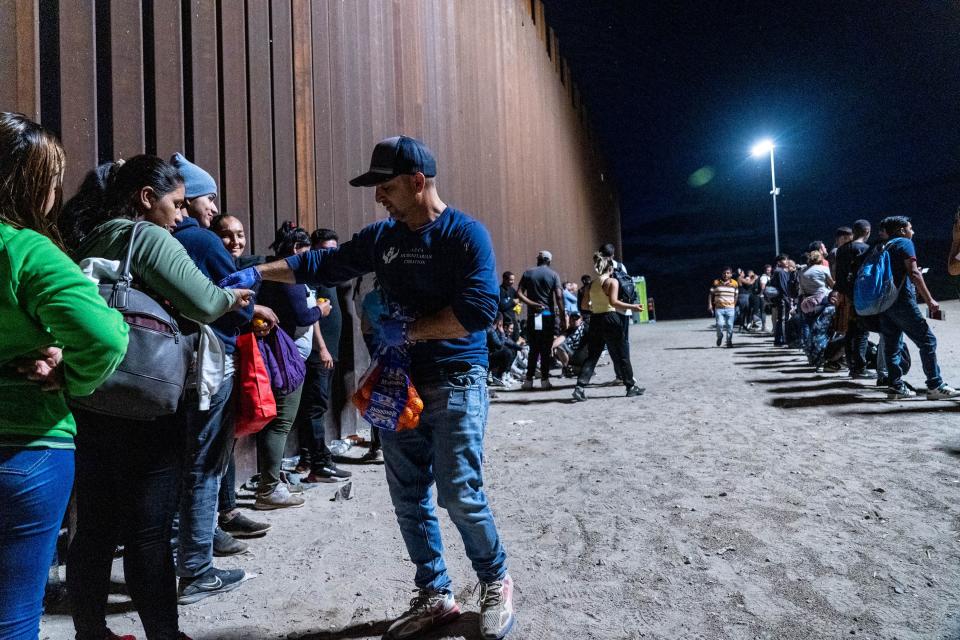Arizona officials cheer Biden for sending troops to Mexico border while advocates blast him
- Oops!Something went wrong.Please try again later.
Local Arizona officials welcomed President Joe Biden’s decision to send 1,500 troops to the U.S.-Mexico border on Tuesday as migrant advocates blasted the move.
Biden’s decision comes days before Title 42, the pandemic-era health rule that’s been used to rapidly expel more than 2 million migrants, is expected to expire. Officials are preparing for an increase in migrant encounters when the restriction lifts May 11 and in the following days.
The troops will do ground detection, data entry, warehouse support and other administrative tasks so that U.S. Customs and Border Protection officials can focus on fieldwork, U.S. Department of Homeland Security officials said.

State and local officials of border communities welcomed the move that they say will relieve the strain on Border Patrol and allow agents to better focus on their jobs. Biden’s decision is part of an effort to mitigate overcrowding and facilitate asylum processing at the southern border after Title 42’s expected expiration.
Migrant advocates in Yuma and Tucson, however, condemned the decision to further militarize the border, describing it as a “huge” mistake that will lead to further “death, suffering and destruction.”
“The last thing we need is further militarization of the border,” said Isabel Garcia, co-chair of the Coalición de Derechos Humanos, a Tucson-based immigrant advocacy group.
“I'm outraged that this is the way (Biden) is planning to handle the mass migration flows that we see from areas of the world where people are fleeing really dire situations.”

The troops will not do law enforcement work and will be sent down for roughly 90 days, though their presence can be extended if necessary, officials said.
Troops will begin to arrive as soon as May 10. The Army and Marine Corps will provide the troops.
There are 2,500 National Guard forces at the border. It is still unclear how many troops will be sent to each part of the border.
"People seeking protection in the United States should be met with humanitarian aid, medical and mental health professionals, social workers, and lawyers, not with soldiers and law enforcement agencies," Laura St. John, legal director for the Florence Immigrant and Refugee Rights Project, said in a written statement.

In Yuma, Fernando Quiroz, director of the AZ-CA Humanitarian Coalition, said that bringing the military to the border is not a solution. Quiroz and his organization help provide food, water and heat relief to migrants along the Yuma-Mexico border.
“Our military is set up to do other things and it just saddens me that this administration has decided to take that step,” Quiroz said. “That's not who we are and that should never be the image of America.”
Quiroz invoked the story of Vice President Kamala Harris’ parents who immigrated to the U.S. from India and Jamaica. Harris often talked about her immigrant parents during her presidential run in 2020.
“How would it have been if (Harris’) own parents would have been met, as they sought asylum, with military saying you're not welcome,” Quiroz asked. “That's the reality.”

Local officials characterize deployment as 'step in the right direction'
Local elected officials spoke with Sens. Kyrsten Sinema, I-Ariz., and Mark Kelly, D-Ariz., on the morning of the announcement to discuss plans in place ahead of Title 42’s potential lifting.

“Mobilizing active duty personnel to our Southern Border will provide some relief to the serious strain Arizona border communities face every day,” Sinema, I-Ariz., said in a written statement. “The Administration must do more to enact a real, workable plan to secure our border, keep Arizonans safe and secure, and ensure migrants are treated fairly and humanely.”

Yuma County Supervisor Jonathan Lines said the deployment is a step in the right direction and that any additional support is “wonderful.” Lines said he hopes the military presence will provide additional pressure and slow the process of people crossing the border without authorization.
“We support the military and we're grateful that they'll be able to be here in a support role for the men and women in green and blue,” Lines said.
U.S. immigration plans: Pandemic-era border rules end next month, but new US migrant plan hinges on Mexico
Yuma Mayor Doug Nicholls echoed Lines by welcoming the military deployment as a move in the right direction. Nicholls also questioned how effective the troops would be at freeing Border Patrol agents up to focus on their duties.

“It's basically an acknowledgment that there's something that really needs get done on the border that's out of the ordinary,” Nicholls said.
“I'm sure it will help, to what degree, I'm not quite sure.”
Former Arizona Gov. Doug Ducey dispatched the National Guard to the border after declaring a state of emergency in April 2021.
In February 2022, former Attorney General Mark Brnovich issued a legal opinion saying that Ducey would be authorized to use state military force against an “invasion” of drug cartels and criminal gangs.

CBP and Border Patrol officials have not yet spoken with Nogales Mayor Jorge Maldonado about the military deployment, according to Maldonado. Maldonado said he’s just trying to prepare the community before the sunset of Title 42.
“It's nothing that we should fear,” Maldonado said in regard to the military deployment.
More: Migrants don't have a right to an attorney in immigration court. Democrats want to change that
Douglas Mayor Donald Huish said the military deployment is a move in the right direction but maintained that there are many more aspects regarding the potential end of Title 42 that still worry the community.
“If they're just going to handle administrative type things, that will be a help which hopefully will relieve the Border Patrol to be able to do the job that they've been hired to do,” Huish said.

Huish emphasized the need for transportation, temporary shelters and an overall plan for how the Biden administration plans to process people in an orderly fashion.
The small border community of Douglas has few resources and little infrastructure in place to help feed, house and transport migrants passing through the community toward their final destinations, Huish said.
“There's no resources in Douglas itself to be able to help them,” Huish said.
Critics of Biden’s move have drawn comparisons to former President Donald Trump, who deployed active duty military personnel to help Border Patrol agents ahead of the arrival of a migrant caravan from Central America in 2018.
The troops only added to the National Guard forces already present.
The Associated Press contributed to this report.
Have a news tip or story idea about the border and its communities? Contact the reporter at josecastaneda@arizonarepublic.com or connect with him on Twitter @joseicastaneda.
This article originally appeared on Arizona Republic: Arizona advocates blast Biden for sending troops to Mexico border

